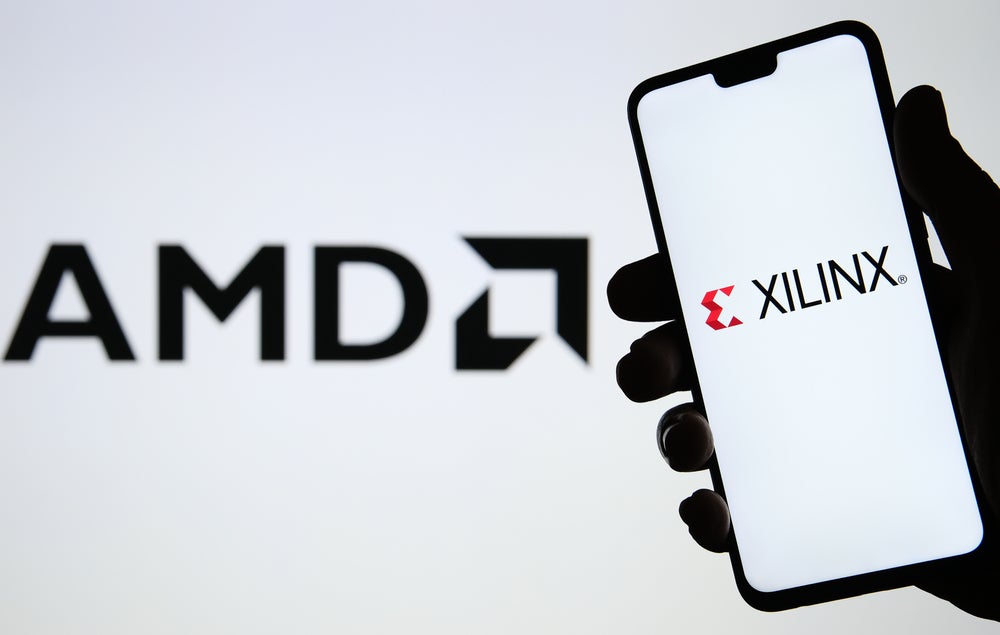
Chinese regulators have given approval for chipmaker Advanced Micro Devices (AMD) to acquire US chip company Xilinx for $35bn, removing the last obstacle to the deal going forward.
The deal, already passed by US, UK and European regulators, is one of the largest of recent times in the worldwide semiconductor industry and comes at a time of global supply chain woe.
In approving the mega-deal, China’s State Administration for Market Regulation asked AMD not to discriminate against Chinese clients, according to the South China Morning Post. It also required AMD to continue supplying Xilinx products to China, and to allow them continued support for Arm processors.
San Jose’s Xilinx is known for being the first company to use the fabless model. It also invented the field-programmable gate array (FPGA), a type of integrated circuit that can be configured after it has been manufactured.
“Like any company with a footprint in China, AMD was at the mercy of the regulator over Xilinx,” says Michael Orme, senior analyst and China specialist at GlobalData.
“It was no stone cold racing certainty that the Chinese regulator would approve the deal, despite the help AMD has given Chinese companies to license and build x86 compatible processors for the Chinese home market since 2015.
How well do you really know your competitors?
Access the most comprehensive Company Profiles on the market, powered by GlobalData. Save hours of research. Gain competitive edge.

Thank you!
Your download email will arrive shortly
Not ready to buy yet? Download a free sample
We are confident about the unique quality of our Company Profiles. However, we want you to make the most beneficial decision for your business, so we offer a free sample that you can download by submitting the below form
By GlobalData“Things were not plain sailing, with AMD having to agree to strict conditions about AMD bundling its CPUs with Xilinx FPGAs to derive an unfair competitive advantage, and to in no way stop Xilinx from working with other CPU and GPU architectures in China.”
AMD first announced the deal in October 2020. Through the Xilinx acquisition, the Santa Clara-based semiconductor giant will be gain an edge against the likes of Intel and NVIDIA through expansion into fields such as automotive.
In recent years, Xilinx has become a major player in the auto space. As Verdict covered in 2019, the adaptability of Xilinx’s FPGA chips is useful for advanced driver assist and autonomous driving systems.
FPGA chips will also give AMD an edge in the data centre market.
“With Xilinx’s re-programmable FPGA chips in its armoury, AMD presents even more formidable competition to Intel in the data centre market,” says Orme.
“FPGAs are an essential component in any chipset fit to power today’s data centres, and hard-core opinion rates Xilinx technology higher than Intel’s.”
The deal’s approval in China comes as Beijing seeks global trade fixes in 2022. This week saw it relax trading rules in the logistics hub of Shenzhen, while last week new data showed some growth in its domestic chip industry.
Semiconductor output in China grew by 33 per cent last year – double the growth rate in 2020 – according to government data. The country remains reliant on South Korea, the US, Taiwan and to some extent Japan for its semiconductors, with 432.5 billion integrated circuits imported in 2021. This came at a total of $432bn, a 23.6 per cent year on year increase.
Approval of the Xilinx deal will keep China from losing chips at a time of supply disruption. Orme, though, doesn’t expect a reversal of fortunes in Asia for the all-but-dead NVIDIA-Arm deal, even if China is asking AMD to remain ARM-compatible.
“AMD will continue to support Arm processors despite all its processors being x86 compatible,” says Orme. “It is too early to assume that this all means a green light again to Big Tech M&A with Nvidia almost certainly being timed out, blocked by one or other of the UK, US, EU or Chinese regulators or simply walking away from its acquisition of Arm.”
As forecast in a recent set of TMT predictions for 2022 from GlobalData, geopolitical tensions within the semiconductor industry will likely increase this year.
GlobalData also forecasts the US will spend $52bn on semiconductor production over the next five years.



